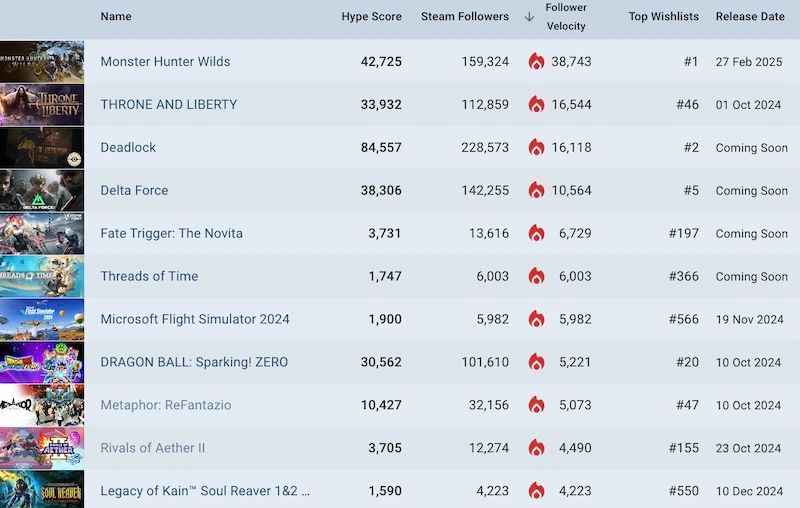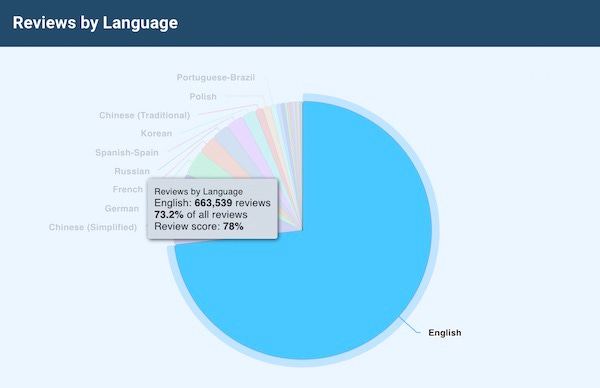Does UGC power sales & retention for games?
Also: how Steam review positivity differs per language, and lots of news.
[The GameDiscoverCo game discovery newsletter is written by ‘how people find your game’ expert & company founder Simon Carless, and is a regular look at how people discover and buy video games in the 2020s.]
Welcome back, folks, and we’ve got a confession to make. Frankly, today’s GDCo newsletter is just too interesting*. You might want to put it down, or take some kind of sedative before continuing. (*It’s got two stories with a lot of graphs in them, at least.)
Also: as a reminder, if you’re not a GameDiscoverCo Plus subscriber and are missing out on both our weekly newsletters, Discord, ‘basic’ Plus data tier, etc, it’s still 25% off, and we just don’t know how soon we will end that offer. (Readers, we really don’t.)
Does UGC power sales & retention for games?

We’ve been asking ourselves the question for a while at GameDiscoverCo - how do you quantify the effect of adding user-generated content (UGC) for your PC or console game? In general, it seems like a ‘good idea’ to us - but how good?
I’ve also experienced UGC through being an advisor to (and the original investor in) No More Robots, who published Ragesquid’s hit mountain biking game Descenders. That title benefited from a modding community building out awesome new bike parks - many optimized and ‘officially’ integrated into the console versions of the game.
So when UGC service provider mod.io commissioned GDCo to research this question a few months ago, we dove hard into the data, with no particular agenda, other than to work out whether we could see a revenue or retention difference.
We chose to use bigger games on Steam, with at least $1 million revenue generated in their first month, and with at least 10,000 lifetime reviews. Around 1,000 games met that criteria, with about 20% of them having UGC*.
(*We used Steam Workshop as the main indicator for this test, since it’s difficult to automagically see whether a Steam game has their own custom solution, or third-party modding clients like mod.io or Curseforge integrated.)
Here’s what we discovered - over 1 year, games with UGC only had a 7% revenue advantage over ones without. But over 5 years on sale, that amount increased to 23% - not inconsiderable, if you think about it.
We also took a look at Day 1 CCU peak retention for some of these top games - remember, this is a median figure, and results may vary significantly. But we saw some notable differences - 64% greater CCU retention after 2 years for games with UGC, and 90% greater CCU retention after 5 years:
Now, needless to say, there’s a giant ‘chicken or egg’ issue here. Were certain games more successful, and then added UGC because of it? Or are the genres that are better at retaining players on Steam more likely to be UGC-centric ones?
We can’t answer that - or discuss knock-on effects on paid DLC adoption if you have free UGC content too. But we can say that games with UGC on Steam performed better than those without - implying that free UGC and $ DLC can co-exist fine.
On that front, Escape Simulator is a good example of a game that combines paid DLC and free UGC very effectively right now on Steam. And data from a SnowRunner study done with mod.io showed that players were 2.4x more likely to buy DLC if engaging with UGC. (*Bearing in mind that correlation / causation is a pill here, too.)
In the longer-term, companies like mod.io are interested in introducing UGC monetization to the mix - something Roblox and others are already doing extensively. That would be an interesting wrinkle - and something that titles like Skyrim are (re)exploring with its Verified Creations paid mods.
The road to UGC monetization for many PC/console games has been fraught with false starts like the original 2015 Skyrim paid mods controversy, so the jury is still out on its future. But to us, making free UGC easy for players to make - no matter which tool you use - seems like a no-brainer, for certain genres of game? That’s our 2c!
Chinese & English Steam reviews: how different?
There’s so much great Steam data on players’ impressions of games, including overall review positivity (thumbs up or down!) And our Plus data back-end recently added the latter to our ‘reviews by language’ chart, e.g. on GDCo’s Helldivers 2 page (above!)
We find Simplified Chinese language reviewing habits particularly interesting - it’s the #2 most-used review language on Steam, btw. And there’s anecdotal data that the Chinese audience reviews harsher than the West. True? We grabbed positivity data for all Steam games with >50 reviews in each language. Here’s what we ended up with:
Across around 8,000 Steam games that we surveyed, this chart shows:
the median game is reviewed 1% more positively in English than in Simplified Chinese.
a game in the 10th percentile (position #800, more or less!) was reviewed 14% better in English.
a game in the 90th percentile (#7200) was rated 9% worse in English.
There’s definitely a skew there - maybe not as big as we expected. However, we noticed that most of the titles with better reviews in Chinese were much smaller ones - they only just made the 50-review threshold. So we ran it again with >1,000 reviews:
This is closer to what we’d expected from looking at big Western games that also got sales in China. The median is now 2% better reviewed in English, the 10th percentile is 15% better reviewed in English, and the 90th percentile is only 4% worse reviewed.
We can’t say exactly why this happens, and whether the lack of Steam forum access (which is blocked by the Great Firewall of China) makes a difference with people bug reporting directly in reviews. But it’s a thing - and now it’s a documented thing!
Finally, we thought it’d be interesting to pull out some examples that you might all have heard of, to illustrate the surprising disparities you can see sometimes:
But whyyy? Some of these we kinda understand, and will try to explain:
Helldivers 2 had that retroactive PlayStation Network requirement, of course. This was particularly hard-felt in China, since a mainland Chinese PSN account doesn’t work with the game.
Games like Wildfrost and Peglin seem to have run into some cultural differences, particularly around game difficulty in roguelikes or deckbuilders. (The Chinese do not appreciate failing repeatedly, and will review as such!)
Straightforward Western AAA titles like Forza Horizon 5 or Grand Theft Auto V don’t have seem to have much of a review positivity difference between the English and Chinese versions - they do what you expect, and are rated as such.
Anyhow, regional review positivity is a fascinating stat that has been underexplored, and so we hope this small look into it was interesting. (It was for us.) Avanti!
The game platform & discovery news round-up…

Finishing things up here, there’s a whole bunch of news breaking just as we are rounding out the newsletter, which is always ‘entertaining’. But let’s do it:
Epic’s UnrealFest is underway, and The Verge is doing a sterling job with a liveblog. The big announce? ‘Launch Everywhere With Epic’: “Starting January 1, you can reduce your Unreal Engine royalties from 5% to 3.5% if you ship your game simultaneously on the Epic Games Store and other stores on PC and Android.” Huh!
On the Fortnite & UGC side of things, Epic has paid out $479 million to UGC creators since the March 2023 revamp, first-person mode is now available in-game for UEFN builders, and Teenage Mutant Ninja Turtles licensed a bunch of props and NPC bad guys for anyone to use to make levels.
We compiled our latest GDCo Plus ‘trending’ unreleased games on Steam as of Monday on LinkedIn (above). Overall, Capcom's Monster Hunter Wilds is taking off, after opening pre-orders and trending at Tokyo Game Show. And the Chrono Trigger-ish 2D JRPG Threads Of Time also sparked interest after a TGS reveal.
Xbox things: the latest wave of Game Pass titles includes Sifu, Inscryption & more, after that surprise TGS drop (Katamari, Mana!); various Xbox OS updates include Game Bar Compact Mode for handheld PCs & pre-downloading Xbox patch options; Xbox Research is expanding to cover game developer experience.
Discord is really starting to push its Embedded App SDK, which are “multiplayer games and social experiences that can be launched in Discord” - basically ‘Discord as a game platform’. They’re working on discovery, and just turned on in-app purchase options for game devs. (Worth keeping an eye on!)
Microlinks: California’s new law around disclosing ‘licensing vs. buying’ digital items was spawned by complaints around PSN and Ubisoft’s The Crew; talking of PSN, they had a bit of a gnarly outage yesterday, now resolved; Microsoft has discontinued the Hololens 2 AR device, with no replacement planned.
A little bird tipped us that the Steam ‘More Like This/All’ page for individual games got revamped in that recent ‘More from Publisher’ rollout. (It’s slicker, and maybe highlights unreleased games a tad more!) Also, there’s an ‘Your Upcoming Releases Queue’ at the bottom of the Upcoming Games page we don’t remember..
Thought this Lester Chen musing on the PC/console market was interesting: “Large budgets can create more content, but not better gameplay… new/advanced gameplay is mostly coming from focused indie teams who have zeroed in on the fun… the ‘big’ games marketing playbook is dead and losing to lean social and community teams.”
What, more Epic news? The company sued Google and Samsung over “illegally conspiring to undermine third-party app stores” by autoblocking them; Apple is getting yelled at by the judge re: document review deadlines in its ongoing Epic case, leading to sassy Tim Sweeney quote tweets. It’s all happening!
Random microlinks: Netflix’s most-watched TV/movie content for H1 2024 is fascinating to poke at; why we’re seeking out ‘smaller and smaller worlds’ in social media; Red Letter Media talks ‘IP remakes’ in watched media, ohdear; fresh from his cutting Dr. Who critique, here’s a little Adam Curtis interview to cheer everyone up.
Finally, if you’re interested in a one-hour long video deconstructing 2D fighting game subgenres (you nerd!), Core-A Gaming has an absolute brute of a video for you:
[We’re GameDiscoverCo, an agency based around one simple issue: how do players find, buy and enjoy your PC or console game? We run the newsletter you’re reading, and provide consulting services for publishers, funds, and other smart game industry folks.]







I guess Elite Dangerous has nostalgia appeal in English-speaking markets which it lacks in Simplified Chinese-speaking ones? Or maybe the space-trading-combat genre never established there.